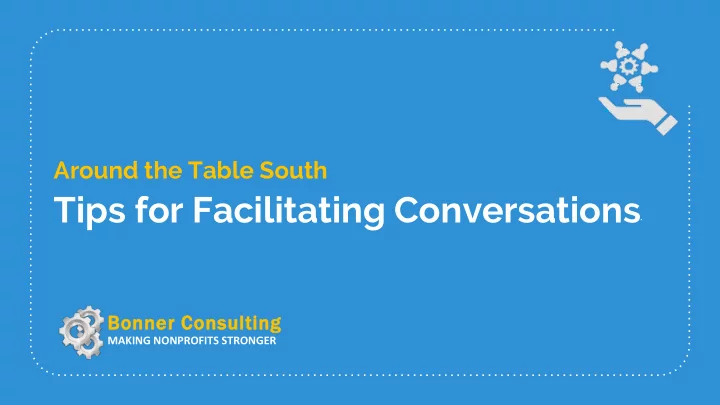

Around the Table South Tips for Facilitating Conversations Bonner Consulting MAKING NONPROFITS STRONGER
Welcome How many of you have hosted a similar conversation? What are your biggest concerns or questions that you hope I will address today? 2
Your Role as a Host ● Your job is to set the tone. Find the balance between no structure and micromanaging with too much structure. ● Create a comfortable and safe environment ● Welcome participants and orient them to the event and its purpose. ● Ask the participants to make some communication agreements with each other. ● Start the dialogue by posing a question and then help the group transition to a less structured conversation. ● Remind participants about their agreements if they forget them. ● Make sure everyone gets a chance to speak ● Guide the group through the dialogue, keeping an eye on time, the agreements, the purposes, and the spirit of the conversation. ● End the session in a way that helps participants to feel a sense of completion and, if relevant, address next steps.
Today we’re going to focus on (chosen theme.) What does (chosen theme) look like in our community and how can we create a healthier community so every voice counts?
Communication Agreement Ideas ● Be curious and listen to understand. Conversation is as much about listening as it is about talking. You might enjoy exploring how others’ experiences have shaped their values and perspectives. ● Show respect and suspend judgment. People tend to judge one another. Try to truly listen, without interruption or crosstalk. ● Be curious. Note any common ground as well as any differences. Look for areas of agreement or shared values that may arise and take an interest in the differing beliefs and opinions of others. ● Be authentic and welcome that from others. Share what’s important to you. Speak from your experience. Be considerate of others who are doing the same. ● Be purposeful and to the point. Do your best to keep your comments concise and relevant to the question you are answering. Be conscious of sharing airtime with other participants. OR We will share airtime and participate within the suggested time-frames. ● We will not criticize the views of others or attempt to persuade them. ● We will “pass” or “pass for now” if we are not ready or willing to respond to a question . ● Be present physically and cognitively – please NO e-mail or phone use. ● Respect requests for confidentiality
The Conversation ● Introductions: One-Two Minutes for each person. Name, What you do or where you live. What brought you to the table today? 10 mins ● What does (chosen theme) look like in our community? Share your experience. 20-30 mins ● How can we create a healthier community so every voice counts? 20-30 mins ● Wrap up question: (pick one) 15 mins ○ In one sentence, share what was most meaningful or valuable to you in the experience of this Conversation? ○ Name one important thing that was accomplished here. ○ Is there a next step you would like us to take based upon the conversation? 6
Conversation Tips ● Time will go faster than you expect ● Go around the table versus popcorn questions - when to use which ● Pause – give people time to think before starting ● Better when people speak from personal experience. Sharing stories is the best way ● Using verbal prompts: ○ Tell me more about that ○ What I think I heard you say ○ It sounds like what your saying is… Is that right? ○ I haven’t heard from … (Insert name), you’ve been quiet. What are you thoughts?
What could go wrong? ● People who talk too much ● People who don’t talk at all ● Verbal abuse or disrespect – people who want to argue ● Sidebar conversations
DEALING WITH THE “DOMINEERING” PERSON PREVENTION: 1. Ground Rule: Share the air. 2. Meet in advance to let the person know that you will be trying to get others to speak, warn them that you will signal them when they are dominating. SCRIPT OR INTERVENTION: ”Let’s hear from some of the folks who have not spoken yet” “That’s an interesting idea. Let’s see if others have suggestions as well.” Use Nonverbals: Move closer and closer to the person, maintaining eye contact. Get in front of him or her. The problematic behavior will start to stand out (even to the person).
Direct, Talkative/Extroverted Results-Oriented Enthusiastic Decisive Optimistic Quick, Impatient Persuasive Problem Solver Lively, Sociable DOMINANCE INFLUENCE Team Player Analytical Patient Reserved STEADINESS CONSCIENTIOUS Good Listeners Precise Sincere Compliant Conflict averse Values Accuracy 10
Note-taking in a community conversation is absolutely critical. You might want to ask someone else to take notes during the conversation. Here are some suggestions for note- taking: • When possible capture the actual words people use. Paraphrasing or summaries are sometimes the best you can do but the words people use are important. • If you can type notes, it’s often better and easier in the long run. Best advice is to capture as much of a word as you can and quickly move to the next word to keep up • Clean up your notes IMMEDIATELY after the conversation. You think you will remember, but you won’t. Go back, fill in the words you left out, add in the letters you didn’t type and other contextual notes.
Any questions You can find me at: leslie@bonner=consulting.com 412-427-7033
Recommend
More recommend